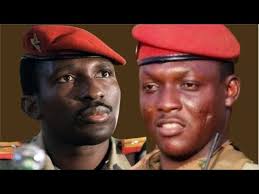37 years to the day when the life of Burkina Faso’s charismatic military leader was cut short by an assassin’s bullet, his compatriots of all political persuation gathered at a memorial in Ouagadougou named after him to pay tribute to his legacy.
The occasion was presided over by none other than Captain Ibrahim Traore, the head of the Burkinabe junta who is for the most part seen in Sankara’s light.
Sankara’s life story has been inspirational not only to his compatriots in the intervening decades since his demise at the hands of some of his former trusted colleagues with whom he had seized power in 1983 led by his close friend and ally Blaise Compaori.
Now exiled in neighbouring Ivory Coast, Compaori would go on to rule Burkina Faso from 1987 until his ouster by a popular uprising in 2014.
Throughout this intervening period, Sankara’s legacy like the untouchable light of a meteorite had been burning bright, refusing to be dimmed by time or human and political machinations.
Today brave, selfless and accessible to his people Captain Traoré is hailed both i Burjina Faso and elsewhere in Africa as the modern day Sankara who had come to continue from where the slain Pan Africanist had left off.
Traore clearly awe-struck by this comparison had not failed to indicae how he was struggling to meaure up to one of th continent’s most acclaimed post-colonial leaders.
He praised Sankara as a “great visionary” whose integrity, patriotism, and commitment to a sovereign Burkina Faso continue to inspire many compatriots like him and Africans and non-Africans alike.
Traore following in his big footsteps acknowledged Sankara’s vision as the guiding force in his own efforts to reclaim Burkina Faso’s national identity which is being undermined by years of an insurgency which had outlasted several military campaigns to end it.
Like Sankara, Traore took power while still in his thirties and used the same kind of rhetoric to mobilise his people to a common cause to deliver Burkina Faso from the throes of an existential threats posed by insurgents at home and a powerful network of western syndicates abroad.
Since his ascension in 2022, Traore like his celebrated predecessor, has been maintaining his pre-coup salary as army captain and drive around in military vehicles that are a far cry from the opulent-looking road toys that are the hallmarks of his peers in West Africa and beyond.
Burkina Faso and the rest of Africa have been taking note, routinely referring to him as a modern exampale of how African leaders should be comporting themselves without any recourse to the shenanigans of high office on the continent.
Retired Colonel-Major Daouda Traoré, who heads the International Thomas Sankara Memorial Committee was speaking in the language of many when he expressed the confidence in Burkina Faso’s progress towards endogenous development, aligning with Sankara’s ideals.
Loose opinion surveys around Africa suggest that with Sankara, there was a lot of things for his compatriots to live for and with Traore many years later, there is hope that Burkina Faso is once again blazing that familiar progressive African trail which has been missing since the likes of Sankara were liquidated.
To cement his legacy, a mausoleum is being built in Ouagadougou dedicated to Sankara and his companions, which will serve as a rallying point for believers of social justice and human rights.
Sankara has been elevated to the rank of “Hero of the Nation,”, day of homage organised in his honour while streets of the capital will be named after each of his 12 companions mowed down by ”traitors’ bullets” alongside him in 1987.
Captain Traore has showed some genuine similarities with Thomas Sankara including his defiance against the world’s traditional powerhouses which had landed him in alliances with emerging nations like China and Russia.
Will these similitudes go as far as mimicking Sankara’s ultimate fate in the hands of his detractors?
WN/as/APA


